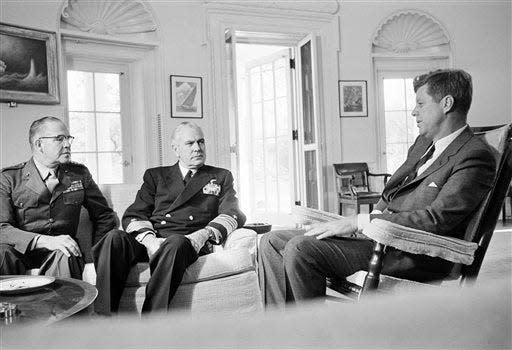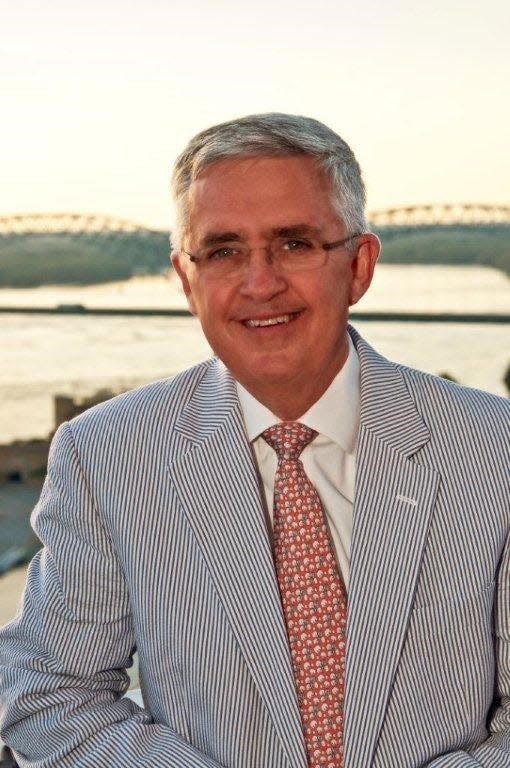As Russian-Ukraine conflict continues, a second Cold War is a legitimate concern | Opinion
- Oops!Something went wrong.Please try again later.
I was born in 1952, in the early years of what became known as The Cold War. As I grew up in the ‘50s and ‘60s, the threat of an attack by Russia was always in the air, literally. When I was just 5 years old, I heard the news that the Russians had fired a satellite called Sputnik into space, and it was orbiting the earth. There was a very real concern in America that Sputnik could drop an atomic bomb on us as it flew across our nation.
In elementary school I took part in “duck and cover” exercises in preparation for a Russian attack. My classmates and I would crouch under our desks, as if a small piece of wood would protect us.
I heard that a neighbor was digging a fallout shelter in his backyard so that he and his family could take shelter from a nuclear attack. I remember my mother asking my father if we should dig one ourselves. My father, a Baptist minister replied, “No dear. If a nuclear war comes, the Lord will just take us home.”
I am not making light of this. The Cold War was very real. In his inaugural address, President Kennedy called it “a long twilight struggle.”

Hear from Tennessee's Black voices: Get the weekly newsletter for powerful and critical thinking columns.
The greatest generation and the cold war
My parents were prepared for such a struggle. They were part of “the greatest generation.” They had grown up during the Depression. My father had served in the Navy in the Pacific during World War II, and he joined the reserves when he returned home. Back on the homefront during the war, my mother had done her part, buying war bonds, cutting back on food purchases during rationing, planting a “Victory Garden,” writing letters of support to our servicemen, and praying for them every day.
My parents had lived a life of shared responsibility and sacrifice. They did not expect life to be easy. They would get through it through faith and perseverance.
I was well aware of my parents’ background and their approach to life, and was proud of them. When my father returned home from work at night, I would greet him by standing at attention on the front porch and giving him a salute. My father, Ensign Haltom, would return it.
I have always wanted to be like my parents. But frankly, I have never had to make sacrifices. There has never been a day in my life when I was hungry or homeless.
On my 18th birthday I registered for the draft, but after receiving a high lottery number, I was never called, and I did not volunteer. Rather than going to Vietnam, I went to the University of Tennessee.
After the terrible attack on America on 9-11, I thought it might be a time of sacrifice. But the war on terror was fought by an all-volunteer Army, and incredibly, my taxes were cut as the federal government put the war on a credit card. President Bush actually encouraged us to respond to the 9-11 crisis by going shopping, calling it “consumer patriotism.”
And since that time, America has become a nation where we are all obsessed with our rights, rather than responsibilities. We have little patience, as we have gone from the greatest generation to the instant gratification generation.
Hear more Tennessee Voices: Get the weekly opinion newsletter for insightful and thought provoking columns.
A possible second Cold War
But now the Cold War may be returning as Vladimir Putin has led a Russian invasion of Ukraine, and a threat to freedom in Western Europe. When we first heard of a possible invasion, the President promised strong economic sanctions against Russia. He offered diplomacy, including even a face to face meeting with Putin. Many if not most of us thought that the threat of such sanctions would persuade Putin to back down, and that some sort of agreement might be reached, such as a promise that Ukraine would not join NATO. Most of us believed the crisis would pass, and we could go back to preparing to watch March Madness.
But Putin was not dissuaded. He sent troops into Ukraine, killing thousands of innocent people. He also engaged in Cold War saber-rattling, warning that he might retaliate against the US and NATO countries with his ultimate weapons.
And now it appears that even with the threat of further and stronger sanctions, Putin will not be deterred.
There will be no instant gratification of our desire for peace. We may be about to enter another long twilight struggle.
I frankly wonder if our generation is up to it. Will we be willing to make sacrifices for the cause of freedom like our parents and grandparents did?

In the same speech in which he talked about the long twilight struggle, President Kennedy said, Americans “shall pay any price, bear any burden, support any friend, oppose any foe to assure the survival and success of Liberty.”
We may soon find out what we price we Americans of this generation are willing to pay. I am concerned we may not even be willing to pay $6 a gallon for gas.
Bill Haltom is an author who resides in Memphis and Monteagle.
This article originally appeared on Nashville Tennessean: All signs point to a second Cold War. How can our current generation adjust?
